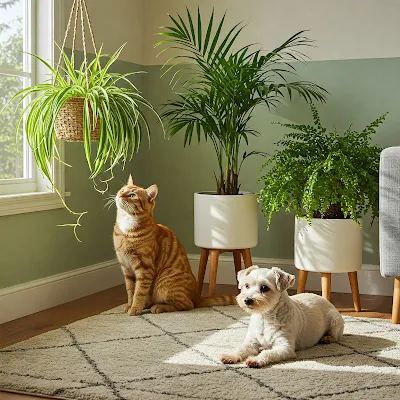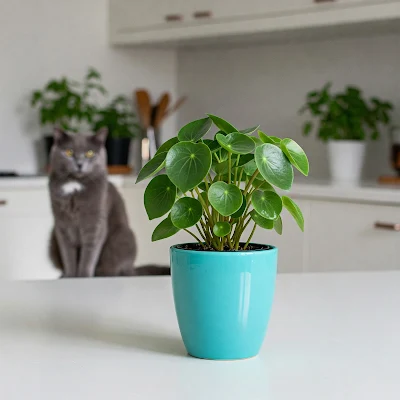Pet-Safe Indoor Plants for Beginners: A Journey to a Safer, Greener Home
 |
| < Pet-Safe Indoor Plants in a Cozy Living Room > |
Transform your home with these beginner-friendly, pet-safe indoor plants. Learn care tips, hear my real experiences, and create a lush, worry-free oasis!
Why Pet-Safe Plants Matter
Like many pet owners, I used to think indoor plants were a risky addition to my home. My cat, Luna, has a knack for nibbling on anything green, and my dog, Max, once knocked over a pot just to investigate. After a terrifying incident with an unlabeled plant from a local market, I realized I needed to be proactive. That scare pushed me to research pet-safe indoor plants that are not only safe for my furry friends but also easy for a beginner like me to care for.
This guide is for anyone who wants to bring greenery into their home without worrying about their pets’ safety. Whether you’re a plant newbie or a seasoned pet parent, these five pet-safe plants will help you create a vibrant, stress-free space.
My Wake-Up Call: A Lesson Learned
Last winter, I spotted a gorgeous plant at a farmer’s market. It was unlabeled, but I figured, “How bad could it be?” That night, I caught Luna chewing on its leaves. My heart sank. After a frantic Google search and a call to the vet (thankfully, Luna was fine), I vowed to only bring home plants that were 100% safe for my pets. That experience taught me that creating a green home doesn’t mean compromising on safety—it means choosing wisely.
The Best Pet-Safe Indoor Plants for Beginners
Here are five pet-safe indoor plants that are perfect for beginners. I’ve included my personal experiences, detailed care tips, and where to find them. Each plant is non-toxic to cats and dogs, according to the ASPCA’s toxic and non-toxic plant list.
1. Spider Plant (Chlorophytum comosum)
 |
| < Spider Plant > |
- Why It’s Great: Non-toxic, resilient, and produces playful “spiderettes” (baby plants).
- My Experience: My Spider Plant, nicknamed “Spidey,” has survived my forgetful watering habits. Once, I neglected it for nearly three weeks, and it still looked vibrant! Luna loves batting at the dangling spiderettes, and I don’t have to worry.
- Price: $6–$15
- Where to Buy: Home Depot, The Sill, local nurseries
Care Tips for Spider Plant
- Light: Bright, indirect light. It tolerates lower light but grows slower.
- Water: Water when the top inch of soil feels dry (about once a week). Avoid overwatering.
- Soil: Well-draining potting mix.
- Pet Tip: Hang it in a basket to keep spiderettes out of reach if your pet is too curious.
- Pro Tip: Propagate spiderettes by placing them in water until roots form, then plant them!
2. Areca Palm (Dypsis lutescens)
 |
| < Areca Palm > |
- Why It’s Great: Non-toxic, adds a tropical vibe, and naturally humidifies the air.
- My Experience: My Areca Palm transformed my dry living room into a mini oasis. Max loves napping under its fronds, and it’s held up despite my heater running all winter. It’s a statement piece that’s surprisingly low-maintenance.
- Price: $20–$50
- Where to Buy: Amazon, Bloomscape
Care Tips for Areca Palm
- Light: Bright, indirect light. Avoid direct sun to prevent leaf burn.
- Water: Keep soil slightly moist but not soggy. Water every 1–2 weeks.
- Soil: Well-draining, peat-based mix.
- Pet Tip: Place it in a corner to prevent pets from knocking it over.
- Pro Tip: Mist the fronds weekly to boost humidity and keep leaves dust-free.
3. Boston Fern (Nephrolepis exaltata)
 |
| < Boston Fern > |
- Why It’s Great: Non-toxic, thrives in humid environments, and adds lush greenery.
- My Experience: My Boston Fern lives in my bathroom, where the shower steam keeps it happy. It’s been a game-changer for adding life to a small space. Luna occasionally sniffs it, but it’s completely safe.
- Price: $15–$30
- Where to Buy: Lowe’s, Walmart
Care Tips for Boston Fern
- Light: Indirect light or filtered sunlight.
- Water: Keep soil consistently moist but not waterlogged. Water every 5–7 days.
- Soil: Rich, well-draining potting mix.
- Pet Tip: Hang it to avoid pets playing with the fronds.
- Pro Tip: Mist 2–3 times a week to mimic its natural humid environment.
4. Calathea (Calathea spp.)
 |
| < Calathea > |
- Why It’s Great: Non-toxic, stunning leaf patterns, and adds elegance.
- My Experience: My Calathea was a bit finicky at first—it didn’t like tap water. Once I switched to distilled water, it thrived. Its leaves “dance” (open and close), which fascinates Max!
- Price: $20–$45
- Where to Buy: The Sill, Etsy
Care Tips for Calathea
- Light: Low to medium indirect light.
- Water: Use distilled or rainwater; water when the top inch of soil is dry.
- Soil: Well-draining, peat-based mix.
- Pet Tip: Keep it on a high shelf if your pet is prone to chewing.
- Pro Tip: Maintain high humidity with a pebble tray or humidifier.
5. Peperomia (Peperomia spp.)
 |
| < Peperomia > |
- Why It’s Great: Non-toxic, compact, and comes in vibrant varieties.
- My Experience: My Peperomia is the easiest plant I own. It sits on my kitchen counter, and I water it sparingly. Luna ignores it, which is perfect for a busy pet owner like me.
- Price: $5–$20
- Where to Buy: Amazon, Etsy
Care Tips for Peperomia
- Light: Bright, indirect light. Tolerates moderate light.
- Water: Water every 1–2 weeks when soil is dry.
- Soil: Well-draining potting mix.
- Pet Tip: Its small size makes it ideal for high shelves or small spaces.
- Pro Tip: Avoid overwatering—less is more with Peperomia.
Why These Plants Changed My Home
Switching to pet-safe plants has been a game-changer. My home feels like a sanctuary—greener, fresher, and safer. Watching Luna nap under the Areca Palm or seeing Spidey’s spiderettes sway in the breeze brings me joy. These plants aren’t just decor; they’re part of our family’s story.
 |
| < Inspirational Quote > |
“Greenery doesn’t have to come at the cost of your pets’ safety. Choose pet-safe plants, and create a home that’s beautiful and worry-free.”
Quick Recap Table
| Plant | Why It's Great | Price Range | Where to Buy | Care Level |
|---|---|---|---|---|
| Spider Plant | Resilient, playful, non-toxic | $6–$15 | Home Depot, The Sill | Easy |
| Areca Palm | Tropical feel, air humidifier | $20–$50 | Amazon, Bloomscape | Moderate |
| Boston Fern | Lush, loves humidity | $15–$30 | Lowe’s, Walmart | Moderate |
| Calathea | Beautiful patterns, safe | $20–$45 | The Sill, Etsy | Moderate |
| Peperomia | Compact, easy-care | $5–$20 | Amazon, Etsy | Easy |
Ready to Start Your Pet-Safe Plant Journey?
Bringing pet-safe plants into your home is easier than you think. Start with one of these beginner-friendly options, and watch your space transform. Not sure where to begin? I recommend the Spider Plant for its resilience or the Peperomia for its low maintenance.
💬 Which pet-safe plant are you excited to try?
✨ Want more tips? Check out our upcoming post: "How to Create a Stunning Pet-Friendly Plant Corner". Subscribe to stay updated!